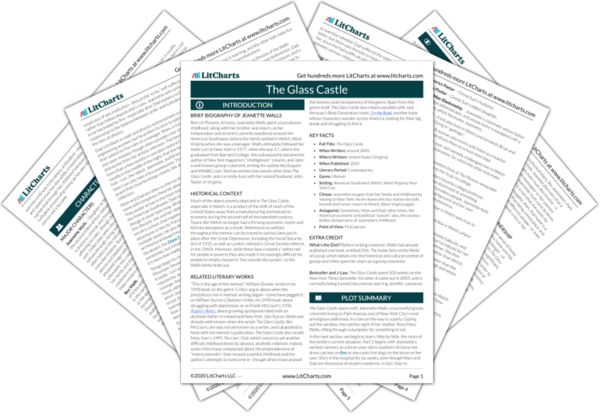Constantly on the run from bill collectors or minor run-ins with the law, Jeannette’s family finds shelter in houses and towns across the country, while Jeannette continues to seek the one place where she can feel most “at home.” In The Glass Castle, this search mirrors Jeannette’s process of growing up: Jeannette idealizes her grandmother’s house in Phoenix, for example, as well as her father’s plans for the Glass Castle. Yet part of her process of maturing involves understanding that a home is not an ideal. It is something she must work to forge rather than relying on romantic models. It is something she must help to build herself.
However, the book resists settling on any one definition of home. A home is not only a physical place, like Jeannette’s Park Avenue apartment in New York. Jeanette discovers that a home can also be – or perhaps even must also involve – a community, such as her school newspaper or her parents’ group of New York squatters. Jeannette must come to terms with her parents’ “home” even if it is not what she wants for herself. The Glass Castle seems to suggest, then, that home is a constantly shifting category rather than being a fixed place, and that the search for it differs between different people—or even for the same person at different moments in his or her development.
Home ThemeTracker

Home Quotes in The Glass Castle
That was the thing about the hospital. You never had to worry about running out of stuff like food or ice or even chewing gum. I would have been happy staying in that hospital forever.

Unlock explanations and citation info for this and every other The Glass Castle quote.
Plus so much more...
Get LitCharts A+When Dad wasn’t telling us about all the amazing things he had already done, he was telling us about the wondrous things he was going to do. Like build the Glass Castle. All of Dad’s engineering skills and mathematical genius were coming together in one special project: a great big house he was going to build for us in the desert.
“Are we ever going home?” I asked Dad one day.
“Home?”
“Phoenix.”
“This is home now.”
Instead of a freshly painted yellow house, or even a dingy gray one, we now had a weird-looking half-finished patch job—one that announced to the world that the people inside the house wanted to fix it up but lacked the gumption to get the work done.
I stared at the plans. “Dad,” I said, “you’ll never build the Glass Castle.”
“Are you saying you don’t have faith in your old man?”
“Even if you do, I’ll be gone.” […] “As soon as I finish classes, I’m getting on the next bus out of here. If the buses stop running, I’ll hitchhike. I’ll walk if I have to. Go head and build the Glass Castle, but don’t do it for me.”
I wondered if [Dad] was remembering how he, too, had left Welch full of vinegar at age seventeen and just as convinced as I was now that he’d never return. I wondered if he was hoping that his favorite girl would come back, or if he was hoping that, unlike him, she would make it out for good.
“You can’t just live like this,” I said.
“Why not?” Mom said. “Being homeless is an adventure.”
I actually live on Park Avenue, I kept telling myself as I hung my clothes in the closet Eric had cleared out for me. Then I started thinking about Mom and Dad. When they had moved into their squat—a fifteen-minute subway ride south and about half a dozen worlds away—it seemed as if they had finally found the place where they belonged, and I wondered if I had done the same.
I also hoped that Maureen had chosen California because she thought that was her true home, the place where she really belonged, where it was always warm and you could dance in the rain, pick grapes right off the vines, and sleep outside at night under the stars.
A year after Dad died, I left Eric. He was a good man, but not the right one for me. And Park Avenue was not where I belonged.
I liked to go for long walks at night. I often walked west toward the river. The city lights obscured the stars, but on clear nights, I could see Venus on the horizon, up over the dark water, glowing steadily.











